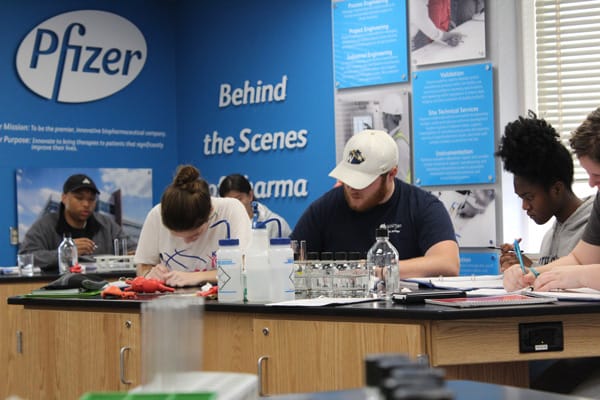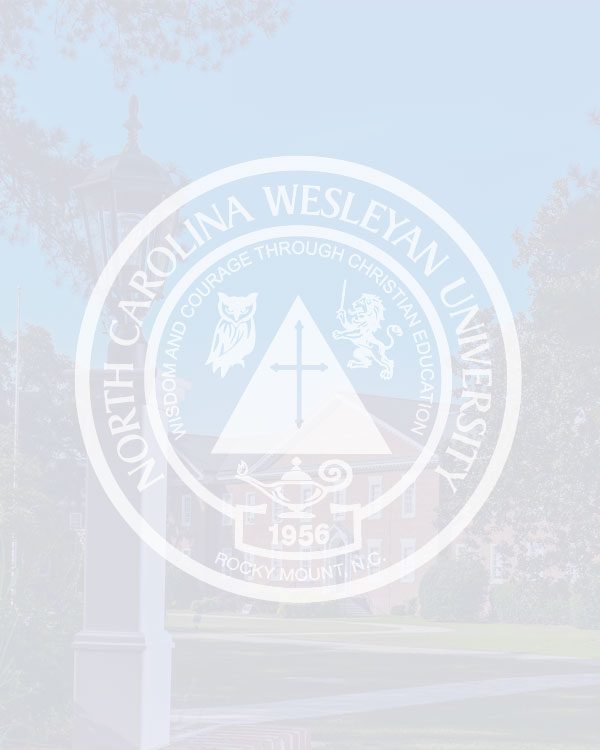Explore what makes up the world around us and why things are the way they are. Use math, theory, and experimentation to study matter and discover how things behave.
What You’ll Study
The NCWU Chemistry Program prepares students for professional advancement, life-long learning and responsible participation in their communities by providing training, experiences, methodology and information in a technical field that is at the center of many professions and is critical to the solution of local and global challenges of today.
Chemistry has been called the central science because knowledge of chemistry and its tools is essential for effective operation in fields from biology to physics, medicine to materials science, nutrition to environmental management and many other areas. The most pressing global issues that we face today are in energy, food, water, health and environment and advances in chemistry will be required for triumph in each. North Carolina Wesleyan University intends to prepare its students to understand these issues from a chemical perspective and bring that perspective to bear on responsible solutions as professionals and informed debate as citizens.
The Chemistry program focuses on the scientific study of the composition and behavior of matter, including its micro- and macro-structure, the processes of chemical change, and the theoretical description and laboratory simulation of these phenomena. Students majoring in chemistry have plenty of hands-on work in the laboratory and are encouraged to work with faculty members on an individual research project.

Faculty & Staff
Email any of our advisors with any questions you have about completing this program.

Pamela Patterson, Ph.D.
Chemistry Program Overview
A degree from the North Carolina Wesleyan University Chemistry Program is the ideal starting point for a successful career in these and many other professions. The program of instruction emphasizes critical thinking and analytical reasoning above all and communication through both written and oral assignments. Students will learn how to use the chemical literature and develop other information skills needed for chemistry study and practice. Our chemistry degree recipients will be ready to enter the working world as chemists or continue on to advanced study in chemistry, engineering, medicine or other chemistry dependent fields. They will have the skills, capabilities and confidence to excel in technology, business or public service.
Here are some highlighted courses included in the Chemistry Major:
CHM 111 – General Chemistry I
General Chemistry I deals with basic descriptions of matter at the atomic and molecular level. Major topics discussed include balancing chemical reactions, behavior of gases, energy of reactions and bonding theories. General Chemistry I lab allows students to perform experiments to discover how theories discussed in lecture are derived from laboratory observations.
CHM 301 – Organic Chemistry I
This course will introduce the chemistry of carbon compounds. Chemical structure, nomenclature, stereochemistry, properties, reactions and reaction mechanisms of the alkanes, alcohols, amines and carbonyl groups will be investigated. The experimental portion will introduce the student to the basic laboratory techniques used in organic chemistry. These techniques will be used in the isolation, purification and identification of common organic solids and liquids. Special attention will be given to important concepts such as extraction, crystallization, distillation and chromatography.
CHM 341 – Analytical Chemistry I
This course provides an overview of Quantitative Analysis emphasizing classical “wet” chemical methods. Statistical treatment of data and sample handling in the modern laboratory are introduced. Gravimetric assays and titrations based on chemical equilibrium involving precipitation, complexation, acid-base and redox reactions are examined with an emphasis on calculations, including the use of spreadsheets. Electrochemical probes and thermal analysis methods are incorporated.
CHM 361 – Physical Chemistry I
The laws of thermodynamics are applied to chemical systems and state functions, including gases and solutions. The molecular underpinnings of these principles are developed through classical statistical mechanics.
PHY 211 – General Physics I
General Physics I is an introductory course in physics that deals with statics, dynamics and thermodynamics. The course includes studies of Newton’s Laws of Motion, gravitation, Law of Conservation of Momentum, work and energy, fluid behavior, heat transfer and thermodynamics.
MAT 121 – Calculus I
Topics will include the Cartesian plane and functions of one variable, limits and their properties, differentiation, the Fundamental Theorem of Calculus, integration and applications of differentiation and integration.
What are the courses like in Chemistry Major at NCWU?
Check out our latest university catalog for learning goals, course descriptions and suggested plans of study for NC Wesleyan University’s Chemistry Program.
- Apply a breadth of knowledge from across the sub-disciplines of chemistry to clearly define and solve chemical problems.
- Generate chemical hypotheses; design and execute experiments to test hypotheses; analyze and interpret data to draw meaningful conclusions from experimental results.
- Effectively communicate chemical concepts and research results orally and in written form to either general or specialized audiences.
- Conduct and present classroom and independent work responsibly and within the highest scientific standards of honesty, accuracy, and objectivity.
- Navigate the chemical literature effectively to retrieve specific information and to inform broader research questions; critically assess the experimental design, results, and conclusions of articles published in the primary literature.
- Conduct chemical experiments safely and in compliance with relevant chemical-hygiene regulations; recognize and minimize hazards in the chemistry laboratory.
How does this degree prepare students for a career?
The Chemistry program helps students understand current global issues, such as energy, food, water, health and environmental problems. Extensive training in methodology prepares students to contribute responsible solutions to their communities through a broad range of career options or continuing educational opportunities.
Job outlook for Chemistry careers
Employment of logisticians is projected to grow 6% from 2021 to 2031, 6% (As fast as average) for all occupations.
About 8,200 openings for chemists and materials scientists are projected each year, on average, over the decade. Many of those openings are expected to result from the need to replace workers who transfer to different occupations or exit the labor force, such as to retire.
Employment
In pharmaceutical and medicine manufacturing, chemists will be needed to develop nanotechnology for medicinal uses. And in chemical manufacturing, these workers will be needed for improving environmental safety in the workplace and community. Materials scientists will be needed to develop cheaper, safer, and better quality materials for a variety of uses, such as in electronics, energy, and transportation.
Career Options
- Materials Scientists: Analyze and oversee materials and processes related to natural resources such as paper or wood, textiles, or (Paper, Wood, Textiles, etc.)
- Water Chemists: Analyze water systems including water supplies, wastewater, and water treatment operations.
- Teaching Chemistry in Secondary Schools: Teach the principles of chemistry to junior high or high school students. See also Middle Grades and Secondary Education programs in the NCWU Catalog for requirements pertaining to Education licensure and training.
- Forensics: Work in cutting-edge labs to perform forensic tests on criminal evidence or participate in chemical research on developing new forensic methods.
Wondering what you can do with a degree with this major? Check out these resources from NCWU Career Development & Leadership and the Occupational Information Network (O*NET).
Wesleyan is dedicated to assisting students in their professional development offering resources and guidance for hands-on learning experiences through internships, assignments within the courses and job search resources. Let us help you focus on your education and career at the same time!
24/7 Tutoring Services. Free & Easy.
North Carolina Wesleyan University is partnered with Brainfuse, a complimentary online tutoring service, provided to all Wesleyan students. This service is available 24 hours a day, seven days a week and features live tutoring in the subjects of writing, reading, math, computer and technology, science and business.
Student Organizations
Be engaged at NCWU!
Choose from 30+ student-led clubs and organizations to connect with other students who share your academic interests or… create your own.
Transfer Articulation Agreements
To simplify the transfer process, NC Wesleyan University has a number of partnerships with other community colleges, universities and institutions that allow students to enroll at NCWU with simple pathways. These agreements outline the courses you should take to prepare for transferring to NCWU. Review the full list of transfer articulation agreements to see if your institution is listed.




